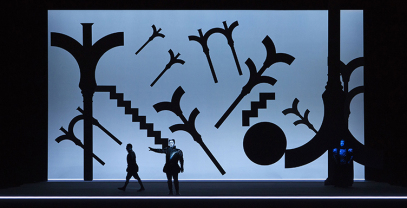
temp
OTELLO
Giuseppe Verdi
Opera
Dimitra Trypani
95'
From to
Indeed, even in difficult times, the Greek National Opera has purposefully developed musical culture. It has made the best use of its resources and proved its indispensability. This is also confirmed by the composer Dimitra Trypani. With its two stages, the National Opera has given new impulses to musical life in Greece. "This house has everything a world-class stage should have." Five years earlier, the Greek National Opera had been considered a place for the ordinary repertoire with the ordinary works: for a "certain elite". Now, five years later, the National Opera is no longer a "place of introversion" but a "place of extraversion". "You see a lot more young people coming to the opera. Five years ago that was not the case. It has to do with the programming and the fact that you can enjoy a great complex of buildings before and after the performance."
The opening of the current season saw the premiere of a commissioned work by Trypani: Andrei. Behind it is a "Requiem in eight scenes" in memory of Andrei Tarkovsky. The Russian-Soviet filmmaker, who died in 1986, would have celebrated his 90th birthday in 2022. In her sound performance, Trypani simultaneously directed and conducted the 19-member ensemble of music, singing, dancing and acting soloists. They portray Andrei variants or imaginary key figures from Tarkovsky's seven films. The libretto by Pantelis Boukalas combines German texts from the Lutheran Requiem Mass and dialogue fragments from Tarkovsky's films. The result is an interdisciplinary musical performance with strictly structured polyrhythms, body percussion and quasi-minimalist patterns. In general, the Greek National Opera has experimented and broken open a lot since 2017: at the "Alternative Stage" also concretely with the space including the different positions of the audience or the podium.
Marco Frei, Das Orchester
The dominant idiom of the score is muscular tonaliry, densely packed and layered, though at moments the harmonies take on the amorphous glow of Ligeti. It makes arresting use of the sounds of inhalation and exhalation and there are passages of chanted speech. A salient feature is a strong rhythmic drive: in the Nostalghia section (which quotes Latin liturgy) there aresubtle suggestions of the syncopations of Latin dance, and moststriking of all is theintermittent use of tightly marshalled body percussion-signalled by the energetic composer as she conducted from the shallow pit to one side of the stage. Such was the discipline and immediacy of the performance that it was astonishing to discover that only some of the participants were classically trained professional singers others were actors, dancers, directors, instrumentalists and composers. (Rehearsals, it seems, had been going on for more than six months.) Dressed in uniform grey robes by Nikos Kokkalis and choreographed by Ermira Goro, they grouped and regrouped around the neutral-coloured, tiered set, with itsslab-like ramps (design was by Elena Stavropoulou, lighting by Valentina Tamiolaki). There were, however, no filmic elements. As Trypani asserted, 'Andrei is neither concert nor opera nor work of theatre. It is a ceremonial "sound performance"-one you can choose to experience with your eyes open or closed.' While the music, growing from a text steeped in Tarkovsky's aesthetic, sustained dramatic tension and offered surprising diversity within its distinctive soundworld, it seemed almost wilful not to reference the film-maker's extraordinary visual imagination. The scenic possibilities-not least in a state-of-the-art theatre like STAVROS NIARCH0S HALL-could be endless.
Yehuda Shapiro, Opera
Fill in your ticket in the field below
Don't have a ticket?
Please click below in order to buy tickets for the GNO TV performances.
...
